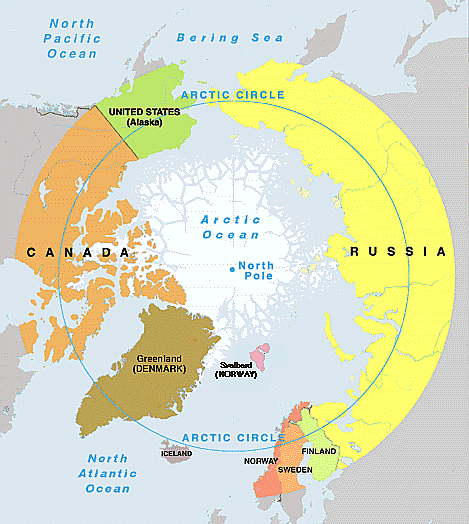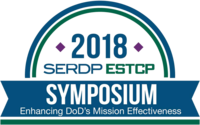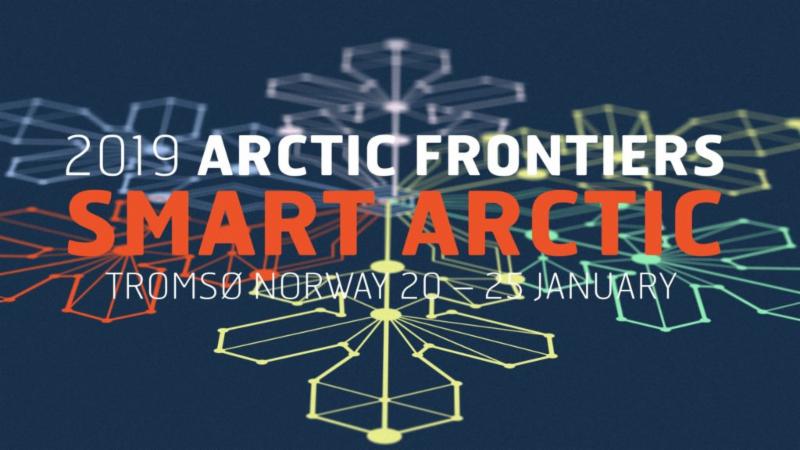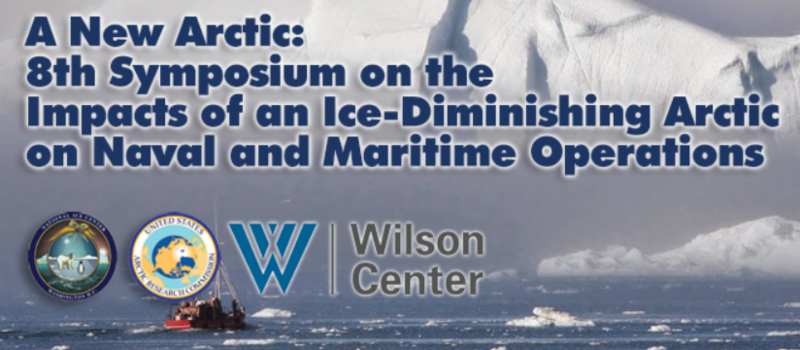|
|
|
|
|
|
|
|
No Arctic- science events are scheduled for today.
|
Media
 Several Countries Lay Claim to Disputed Lomonosov Ridge. Several Countries Lay Claim to Disputed Lomonosov Ridge. Russia and Canada are the most active in claiming the right to expand their presence on the continental shelf in the central section of the Arctic Ocean. In 1948, the Soviet Union organized the North 2 expedition whose members obtained initial data indicating that the Lomonosov Ridge was likely to be discovered. While conducting hydrological measurements, scientists managed to discover some shallow areas north of the New Siberian Islands. This data didn't reach any hard conclusions, but a theory implying the existence of a ridge that divides the Arctic basin was advanced. The Arctic
 Nobel Prize Winners to Address the Arctic: Today and the Future Forum in December. Nobel Prize Winners to Address the Arctic: Today and the Future Forum in December. The 8th International Forum Arctic: Today and the Future will bring together leading Russian and international researchers from a variety of fields, including Oleg Anisimov and Igor Bashmakov from the Intergovernmental Panel on Climate Change, which received the 2007 Nobel Peace Prize. Climatologist Oleg Anisimov will deliver a report on changes in the cryolithic zone of the Arctic at a working session on climate change and the thawing of permafrost. The degradation of the cryolithic zone will be at the top of the session's agenda. Oleg Anisimov believes that this process can dramatically change life in the Arctic. The Arctic
Seminar on Understanding Maritime Pollution Threats and Response Systems in the Russian Federation-United States Trans-Boundary Area. On November 3-10, Doug Helton and Catherine Berg from the OR&R's Emergency Response Division traveled with colleagues from the U.S. Coast Guard and the State of Alaska, to Yuzhno-Sakhalinsk, Russia to participate in a "Seminar on Understanding Maritime Pollution Threats and Response Systems in the Russian Federation-United States Trans-Boundary Area". The seminar involved a number of Russian agencies, industry, and NGOs, including the Russian Marine Rescue Service, the World Wildlife Fund, the Nevelskoy Maritime University, the State Oceanographic Institute, Sovcomflot (a Russian maritime shipping company specializing in petroleum and LNG shipping), Sakhalin Environmental Watch, Rosneft, and Exxon Neftegas. NOAA Office of Response and Restoration
Yale Study: Climate Change Altering Direction of Water Currents. Global warming is changing the range of water currents that flow deep under the surface of the Atlantic Ocean. That's according to new research from Yale examining the effects of melting sea ice in the Arctic Ocean. There's a vast undersea current that carries warm water and cold water all around the Atlantic Ocean. Matthew Thomas with Yale said climate change causes ice to melt in the Arctic, and then the water from that melting ice interferes with the current and causes hot water from the south to flow north instead. WSHU Public Radio
|
|
Future Events
DOD Arctic research session at SERDP/ESTCP, Nov. 29, 2018, Washington, DC. An Arctic research focus will be presented at the SERDP-ESTCP annual meeting "Enhancing DoD's Mission Effectiveness." The Strategic Environmental Research  and Development Program (SERDP) and Environmental Security Technology Certification Program (ESTCP) symposium is a nationally recognized conference focusing on DOD's priority environmental and installation energy issues. This year's meeting, at the Washington Hilton Hotel, 1919 Connecticut Ave., NW, Washington, DC 20009, will feature a technical session on Arctic research under the theme of "Resource Conservation and Resiliency." The session is scheduled for Thursday, Nov. 29th, from 8:30 am to 11:30 am, and will include the following speakers: Andrew Nelson (USACE), John Farrell (USARC), Martin Jeffries (USACE/CRREL), John Woods (ONR-RC), Kevin Bjella (USARC/CRREL), and Hajo Eicken (UAF/IARC). and Development Program (SERDP) and Environmental Security Technology Certification Program (ESTCP) symposium is a nationally recognized conference focusing on DOD's priority environmental and installation energy issues. This year's meeting, at the Washington Hilton Hotel, 1919 Connecticut Ave., NW, Washington, DC 20009, will feature a technical session on Arctic research under the theme of "Resource Conservation and Resiliency." The session is scheduled for Thursday, Nov. 29th, from 8:30 am to 11:30 am, and will include the following speakers: Andrew Nelson (USACE), John Farrell (USARC), Martin Jeffries (USACE/CRREL), John Woods (ONR-RC), Kevin Bjella (USARC/CRREL), and Hajo Eicken (UAF/IARC).
Causes for the record low sea-ice extent in the Bering Sea in 2018, November 19, 2018 (Webinar). This seminar is part of NOAA's EcoFOCI bi-annual seminar series focused on the ecosystems of the North Pacific Ocean, Bering Sea and U.S. Arctic to improve understanding of ecosystem dynamics and applications of that understanding to the management of living marine resources. This webinar will be an in-depth look at the driving factors of a warm Bering Sea including ice arrival, extent, and implications.
American Geophysical Union Fall meeting, December 10-14, 2018 (Washington, DC USA). The AGU 2018 Fall Meeting will mark another dynamic year of discovery in Earth and space science, serve as the advent of AGU's Centennial year, and provide a special opportunity to share our science with world  leaders in Washington, D.C. As the largest Earth and space science gathering in the world, the Fall Meeting places you in the center of a global community of scientists drawn from myriad fields of study whose work protects the health and welfare of people worldwide, spurs innovation, and informs decisions that are critical to the sustainability of the Earth.
USARC Commissioner Jacqueline Richter-Menge to deliver the Nye Lecture at the 2018 AGU Fall Meeting. The US Arctic Research Commission (USARC) is pleased to announce that Commissioner Jacqueline Richter-Menge will present this year's Nye Lecture, titled "A Career of Change," at the Fall Meeting of the American Geophysical Union (AGU) in Washington, DC at 2:50 pm on Tuesday, December 11, 2018 in the Marquis room of the Marriott Marquis Hotel, 901 Massachusetts Ave. NW, Washington, DC 20001.
ArcticNet: Annual Scientific Meeting 2018, December 10-14, 2018 (Ottawa, ON Canada). Canada's North is experiencing unprecedented change in its sea and terrestrial ice, permafrost and ecosystems under the triple pressures of climate change, industrialization and modernization. The impacts of these pressures can be seen on food and energy security, shipping, sovereignty, northern community health and well-being, and sustainable development and resource exploitation. All these issues have brought the North to the forefront of national and international agendas. Building on the success of its previous Annual Scientific Meetings and International Arctic Change Conferences, the Arctic Network of Centers of Excellence announces the 14th ArcticNet Annual Scientific Meeting.
 Arctic Frontiers, January 20-25, 2019 (Tromso, Norway). The Arctic Frontiers is a global scientific conference on economic, societal, and environmental sustainable growth. This year's theme will be "Smart Arctic," with a pan-arctic emphasis, and an effort to build new partnerships across nations, generations and ethnic groups. Arctic Frontiers provides a forum for dialogue and communication between science, government and industry. The plenary program will have five main sessions: State of the Arctic, Blue Growth, Smart Solutions, Bridging the Gap, and Arctic business prospects. An abstract-driven science program will address Plastics in the Ocean, the Future of Governance and Handling Vulnerability in Arctic Ecosystems, State of the Arctic and A Smart Arctic Future.
Save the Date! 
Mark your calendars to attend IDA-8, which some have called one of the best Arctic gatherings around. Historically, this biennial symposium was co-hosted by U.S. National/Naval Ice Center (NIC) and the US Arctic Research Commission (USARC). In 2019, these partners will join forces with the preeminent Wilson Center's Polar Institute, as a third co-host. The now 2-day symposium will be held in the Ronald Reagan Building Amphitheater, in Washington, DC. The event will focus on a broad cross-section of naval and maritime operations and issues in an ice-diminishing Arctic. The symposium brings together nationally and internationally recognized experts on Arctic governance, geopolitics, marine operations, infrastructure, science, and environmental observations, from the local, regional, and pan-Arctic scale. Information on prior symposia, including lists of speakers, video clips, and copies of presentations, is available here. Attendance is free, and registration will begin in Spring 2019. The event will be webcast live, and video recorded.
 of the AAG includes over 8,500 geographers converging from the U.S., Canada, and nearly 60 other countries in a typical year including geographers, GIS specialists, environmental scientists, and other leaders for the latest in research and applications in geography, sustainability, and GIScience. of the AAG includes over 8,500 geographers converging from the U.S., Canada, and nearly 60 other countries in a typical year including geographers, GIS specialists, environmental scientists, and other leaders for the latest in research and applications in geography, sustainability, and GIScience.
|
|

  
4350 N. Fairfax Drive, Suite 510
Arlington, VA 22203, USA
External links in this publication, and on the USARC's World Wide Web site ( www.arctic.gov) do not constitute endorsement by the US Arctic Research Commission of external Web sites or the information, products or services contained therein. For other than authorized activities, the USARC does not exercise any editorial control over the information you may find at these locations. These links are provided consistent with the stated purpose of this newsletter and the USARC Web site.
|
|
|
|
|
|
|
|
|